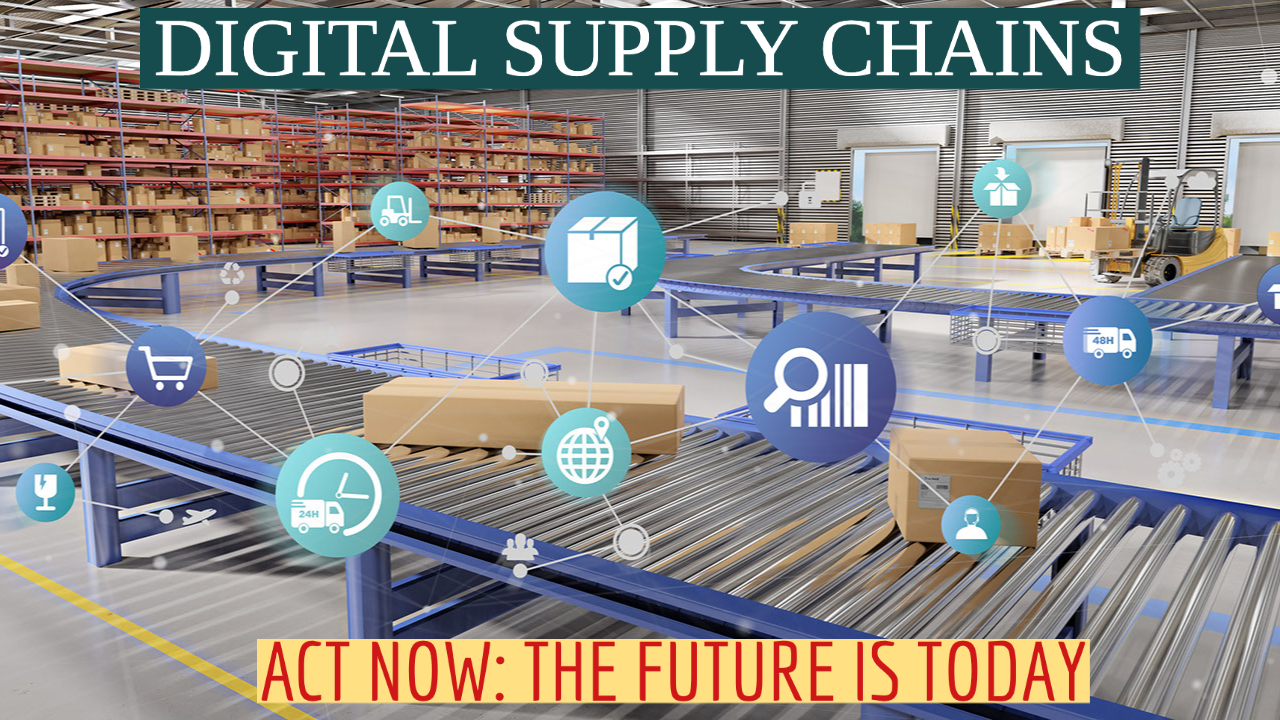ACT NOW: THE FUTURE IS TODAY
The supply chain industry is fragmented and inefficient, with little transparency between the parties involved. The lack of transparency in today’s supply chains has increased costs and product failure rates. A digital supply chain is a decentralised platform that connects all supply chain members, ensuring product quality and efficiency. Digital supply chains are more than just a trend. In recent years, supply chains have steadily transitioned from purely physical to digital models. In addition to digitising the supply chain, the best practices of these digital supply chains use platforms such as IoT and big data analytics to bring efficiency and innovation to an organisation. Numerous manufacturers, including Dell and Intel, want to move their supply chains online. When customers purchase items online, they often do not realise how many organisations produce the product. For example, if an individual ordered a Dell computer, the individual would be connected to Dell’s website. After selecting the desired model and adding it to their cart, they would be connected through Amazon’s servers before finally going to Amazon’s warehouse for shipment.
“THE FUTURE OF BUSINESS IS IN THE CLOUD”
What is a Digital Supply Chain?
The term “digital supply chain” refers to the many connections between a company and other companies to get their products from one place to the other. In the world of global businesses, digital supply chains (DSC) can be challenging to define due to the many aspects and sectors that come together in some ways. It is creating and transferring value through a network of components and intermediaries, all while using digital tools and techniques. These processes and practices develop and distribute goods and services across geographical distances. The digital world has changed everything – from how we work to where we shop. One of the most visible ways this change has been seen is in our supply chains. In a virtual marketplace, where almost anything can be found, two leading supply chains are digital and offline. Offline chains rely on physical goods, like cars and clothing, while digital chains depend entirely on online transactions through computers and smartphones. Nearly all businesses rely on digital supply chains to operate and compete in today’s global marketplace. Digital supply chains have been shown to have many benefits, including better inventory management, order tracking, and more efficient communication with suppliers.

However, there are also some downsides that companies must consider before implementing a digital supply chain system. Supply chains are the backbone of global commerce. They account for producing raw materials, the sourcing of components, and then the assembly or final product sold to consumers. Goods are often shipped thousands of miles around the globe to be assembled in a country with more favourable labour costs before being sent back to their home country for sale. The globalisation of supply chains has recently become more prominent in discussions about how companies react to international trade conflicts and tariffs.
Impact of Digitisation on Supply Chains
Since the proliferation of digitisation, supply chains have shifted. Digitisation has changed how companies operate to serve customers and how customers interact with the products they purchase. Supply chains are now inextricably linked with digital supply networks. In today’s globalised economy, supply chains are digital, and emerging markets demand increasingly. Emerging economies such as China and India have become drivers of world economic growth and the source of a large share of global demand. These two countries produce goods for export and import to meet their domestic consumption needs, making them essential producers and consumers of goods worldwide. Yet, they also need to import products from other countries to meet their needs. In addition, technology has changed the way people do business. Gone are the days when big chains like Walmart would order large quantities of goods from factories and ship containers to distribution centres. Today, Amazon oversees ordering smaller batches that are then sent to Amazon distribution warehouses all over the country.
The Amazon model relies on a heavily digitised supply chain, with RFID chips in packages that track their location in real-time. In the digital age, the supply chain is one of the most important aspects of any company. Unfortunately, in today’s global market, products are designed and packaged worldwide, which can cause a company’s supply chain to become unnecessarily complex. Therefore, we must understand approaches to simplifying digital supply chains for companies in today’s marketplace.
Digital supply chains are an emerging field focusing on the relationship between digital data and its impact on the global and localised supply chain. Digital supply chains, for example, can help companies to optimise production and distribution processes by analysing previous years of inventory management data. This type of analysis has been used in project management’s ability to reduce its cost per unit by millions.
Digitalisation in Project Management, Supply Chain and Operations Decisions
Challenges for Digital Supply Chains
The digital supply chain is an industrial concept formalised by companies like Nike, Apple, and Walmart in the 1990s. The idea of the digital supply chain is that it allows mass customisation to be an integral part of product production. This has led to high customer satisfaction rates because customers can get customised products at reasonable prices. Companies of all sizes must take their dependence on technology and digital data seriously in the modern business landscape. As traditional business models and processes evolve to include digital content and information systems, they face new risks and pitfalls. These risks and pitfalls stem from the fact that these systems have not yet had enough time to evolve with business practices. Companies are also vulnerable to cyber-attacks and data breaches.
Additionally, consumers may feel they do not own their data due to privacy concerns. To this end, businesses must develop and implement a security strategy for managing consumer data. One such approach would be through the adoption of blockchain technology.
Is Blockchain Technology a Solution?
While many people associate blockchain technology with cryptocurrency and other financial applications, blockchain works in several ways. For one thing, decentralised ledger technology enables multiple parties of different backgrounds and skill sets to share and exchange information without centralised control or oversight. This creates more trust among various stakeholders involved in the transaction. As a result, blockchain has proven successful in areas where security is vital, including the finance industry. Furthermore, mismanagement or tampering is virtually impossible since no single party controls the database. Also, transactions are recorded chronologically, so hackers cannot alter them.
Is it the right time?
In conclusion, businesses should make concerted efforts to investigate the benefits of a digital supply chain. It saves time and money while improving customer service and boosting company morale.
In recent years, supply chains have been steadily transitioning from a purely physical model to a digital one. The process has been seamless for some businesses. Still, other companies have struggled to transition from an analogue form of supply management to digital systems that lack real-time visibility into assets and delivery points. Analysts are now focusing on addressing the digital supply chains of today. Maintaining a competitive edge is becoming increasingly complex with the influx of new technologies. The development of digital supply chains will require several changes in how companies conduct business. Buyer-driven commerce has led to a spike in online shopping and economic instability. As a result, customers are demanding more variety and customisation, which is only possible with the help of digital technology. Therefore, supply chains must be transformed to satisfy their clientele fully. Many companies have already begun the transformation by leveraging digital technology to manage supply chains.
ACT NOW: THE FUTURE IS TODAY.
Learn more:
Industry 4.0 in Project Management- Dr Mandeep Saini
Latest Posts
- What is the Cosmic Algorithm?
- How Humans Beat AI? Industry 5.0
- Applying AI in Everyday Life
- Artificial Intelligence in business for individual productivity
- Inventory Types and Demand Management in Global Supply Chains
-

Part-time jobs for international students in the UK
Part-time jobs for international students in the UK: Know the basics Read more
-

4 Simple Tips for Critical Literature Review at Masters Level
Learn with videos: Writing a Critical Literature Review at the masters level for Assessment Report and Dissertation is essential. Read more

